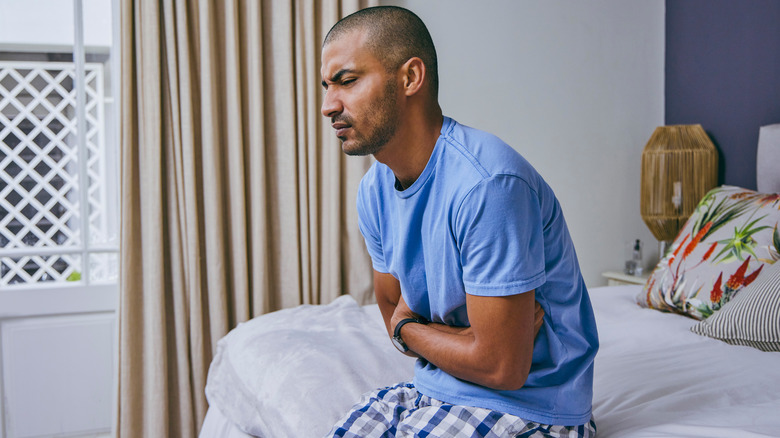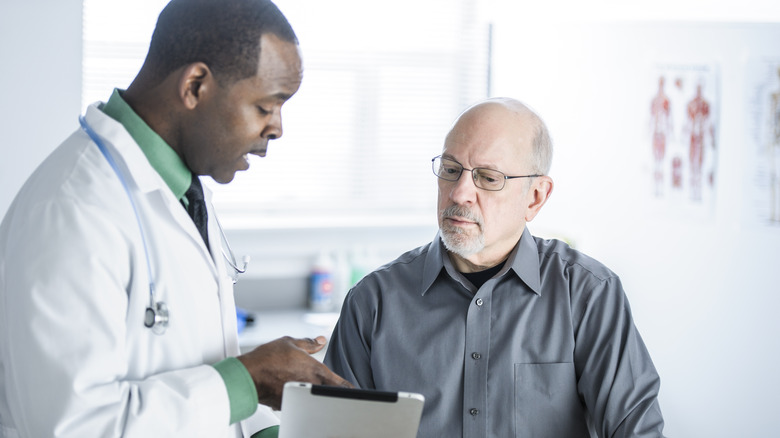Warning Signs Your Stomach Pain Is Actually A Prostate Problem
Your stomach won't always feel great — it's just a fact of life. And in some cases, you may have so much abdominal discomfort that you rush to the hospital, like 5% of all ER visitors, according to the Cleveland Clinic. However, nagging stomach pain doesn't necessarily point to a problem related to the gastrointestinal tract. Prostate issues can cause severe lower abdominal pain, too. That's why you have to consider your symptoms collectively and listen to what your body may be telling you.
How can a condition of the prostate lead to stomach troubles? The answer lies in where the prostate resides in the body, as well as its core function. The prostate is a gland that sits in front of the rectum and under the bladder. Often referred to as being about the size of an average walnut, its main purpose is to produce a special type of fluid that's essential to the makeup of semen, according to literature available from the Institute for Quality and Efficiency in Health Care. Because the fluid expressed from the prostate needs to mix with other semen fluids, the prostate is connected to the urethra.
Under normal conditions, the prostate doesn't cause any discomfort. But if it becomes enlarged, it can become problematic and start to cause some "red flag" symptoms.
Enlarged prostates can exhibit several warning signs
The term "enlarged prostate" refers to a prostate that has started to grow beyond its normal size and thus press on the surrounding anatomical structures.
Another name for the condition of having an enlarged prostate is benign prostatic hyperplasia, or BPH. And BPH is hardly rare. As pointed out by MedlinePlus, around 90% of men who are 80 or older can expect to receive a BPH diagnosis. However, BPH doesn't just happen in senior-age men. After turning 40, all men can be at greater risk of developing BPH.
When you have BPH, your prostate may begin to affect both the efficiency and health of your bladder and urethra. For instance, some men with BPH have trouble completely emptying their bladders when urinating. Others may feel like their urine stream isn't as strong as it once was.
In addition to those warning signs of BPH, the National Institute of Diabetes and Digestive and Kidney Diseases notes that others may include bloody urine, an elevated temperature, and (you guessed it) stomach pain and swelling. Therefore, you may want to contact your healthcare provider immediately if you have abdominal discomfort as well as other possible indicators of BPH or another condition.
Treating prostate problems and solving stomach pain
If a medical professional diagnoses you with BPH, you have several treatment options to consider. For example, mild cases of BPH may be addressed by taking medications. MedicalNewsToday names alpha-blockers and reductase inhibitors as two of the more typically prescribed drugs to reduce BPH and its symptoms.
What if medicines don't help? In that circumstance, surgical intervention may be appropriate. And depending on your diagnosis, you may be a candidate for a minimally invasive type of surgery. As explored by WebMD, minimally invasive surgeries such as those that rely on microwave technologies, pressurized water vapor, or the insertion of medical devices into the area around the prostate can provide relief for some men with BPH.
While it can be hard to hear that your stomach discomfort, abdominal swelling, and other concerns are due to a prostate issue, it's also not the end of the world. Though BPH might be frustrating and uncomfortable, it can be managed and treated. Plus, BPH doesn't mean you're at higher risk for prostate cancer. In fact, a 2021 article published in The Prostate suggests that BPH might offer protection against the development of cancer within the prostate.
Consequently, you don't have to worry if you find out your prostate is enlarged. But you do owe it to yourself to get any consistent stomach pain evaluated to keep your health in check, especially if your stomach discomfort is accompanied by other lower abdomen and genital-related symptoms.


